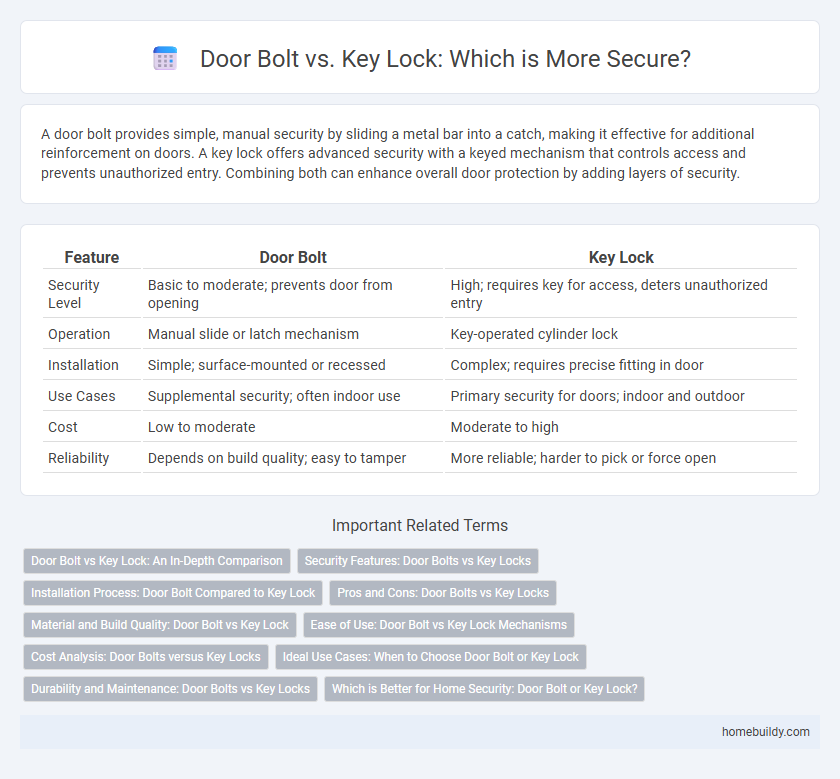A door bolt provides simple, manual security by sliding a metal bar into a catch, making it effective for additional reinforcement on doors. A key lock offers advanced security with a keyed mechanism that controls access and prevents unauthorized entry. Combining both can enhance overall door protection by adding layers of security.
Table of Comparison
| Feature | Door Bolt | Key Lock |
|---|---|---|
| Security Level | Basic to moderate; prevents door from opening | High; requires key for access, deters unauthorized entry |
| Operation | Manual slide or latch mechanism | Key-operated cylinder lock |
| Installation | Simple; surface-mounted or recessed | Complex; requires precise fitting in door |
| Use Cases | Supplemental security; often indoor use | Primary security for doors; indoor and outdoor |
| Cost | Low to moderate | Moderate to high |
| Reliability | Depends on build quality; easy to tamper | More reliable; harder to pick or force open |
Door Bolt vs Key Lock: An In-Depth Comparison
Door bolts provide a simple mechanical barrier that enhances security by physically sliding into a catch or socket, offering quick locking without the need for keys. Key locks rely on a keyed mechanism that adds controlled access, enabling authorized entry and better protection against unauthorized use. While door bolts excel in ease of installation and immediate security, key locks deliver versatility, higher security options, and audit trails when integrated with electronic systems.
Security Features: Door Bolts vs Key Locks
Door bolts offer enhanced physical security by providing a strong, visible barrier that resists forced entry and tampering, often used in conjunction with key locks for added protection. Key locks rely on a mechanical or electronic mechanism that secures doors through keyed access, but can be vulnerable to lock picking or key duplication. Combining door bolts with key locks significantly increases overall security by integrating mechanical sturdiness with controlled access.
Installation Process: Door Bolt Compared to Key Lock
Door bolts typically offer a straightforward installation process requiring only basic tools, making them an ideal choice for quick and hassle-free security enhancements. In contrast, key locks demand precise alignment and often professional installation to ensure proper cylinder and mechanism functionality. The simpler mounting of door bolts on the surface contrasts with the more complex mortising needed for key locks, affecting time and skill levels required for setup.
Pros and Cons: Door Bolts vs Key Locks
Door bolts provide robust manual security by physically securing the door frame, making forced entry more difficult without a key or code, but they require manual locking and unlocking, limiting convenience. Key locks offer easier access with keys or smart keypads, increasing user convenience and enabling multiple authorized users, though they can be vulnerable to lock picking or key duplication. Choosing between door bolts and key locks depends on the priority of enhanced physical security versus ease of access and user management.
Material and Build Quality: Door Bolt vs Key Lock
Door bolts are typically constructed from robust materials like stainless steel or brass, offering high resistance to physical force and corrosion, which enhances their durability in security applications. In contrast, key locks often incorporate a combination of metals and complex internal mechanisms, prioritizing precision engineering over sheer material strength. This difference in material composition and build quality means door bolts provide straightforward, heavy-duty security, while key locks offer intricate locking mechanisms with varying levels of material resilience.
Ease of Use: Door Bolt vs Key Lock Mechanisms
Door bolts provide straightforward ease of use by simply sliding into place without requiring a key, allowing quick and silent locking and unlocking. Key locks offer enhanced security but can be less convenient, as they demand key management and manual turning for operation. For users prioritizing speed and simplicity, door bolts outperform key locks in everyday accessibility.
Cost Analysis: Door Bolts versus Key Locks
Door bolts generally offer a lower upfront cost compared to key locks, making them a budget-friendly option for basic security needs. Key locks often involve higher expenses due to complex mechanisms and added features such as pick resistance and rekeying capabilities. Over time, key locks may incur additional costs in terms of maintenance and locksmith services, while door bolts typically require minimal upkeep.
Ideal Use Cases: When to Choose Door Bolt or Key Lock
Door bolts provide enhanced security for interior or secondary doors, offering quick manual locking without the need for a key, ideal for bedroom or bathroom privacy. Key locks are better suited for exterior doors requiring controlled access, as they allow authorized entry through keys and can be integrated with advanced security systems. Choose door bolts when ease of use and immediate locking are priorities, and opt for key locks when regulated access and higher security are necessary.
Durability and Maintenance: Door Bolts vs Key Locks
Door bolts offer superior durability due to their simple mechanical design and fewer moving parts, reducing wear and tear over time compared to key locks. Maintenance for door bolts is typically minimal, often requiring only occasional lubrication, whereas key locks involve more complex internal mechanisms that may necessitate regular servicing to prevent jamming or key breakage. The robust construction of high-quality door bolts ensures long-lasting performance with less frequent maintenance requirements than standard key locks.
Which is Better for Home Security: Door Bolt or Key Lock?
Door bolts provide robust physical security by reinforcing door strength and preventing forced entry, making them ideal for exterior doors requiring maximum protection. Key locks offer convenient access control and are compatible with advanced locking systems, but they can be vulnerable to picking or bumping without added security features. For comprehensive home security, combining a heavy-duty door bolt with a high-quality key lock enhances resistance against break-ins and unauthorized access.
Door bolt vs key lock Infographic

 homebuildy.com
homebuildy.com